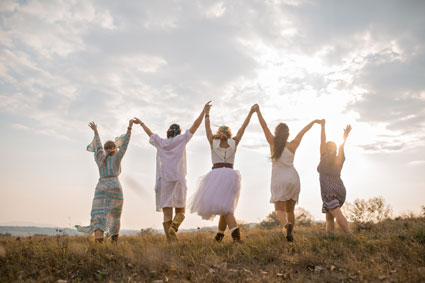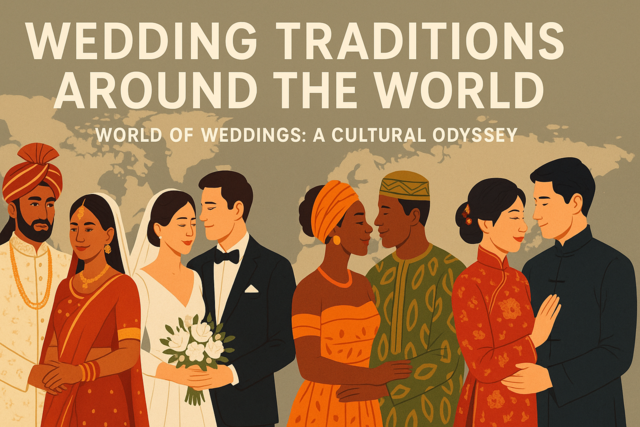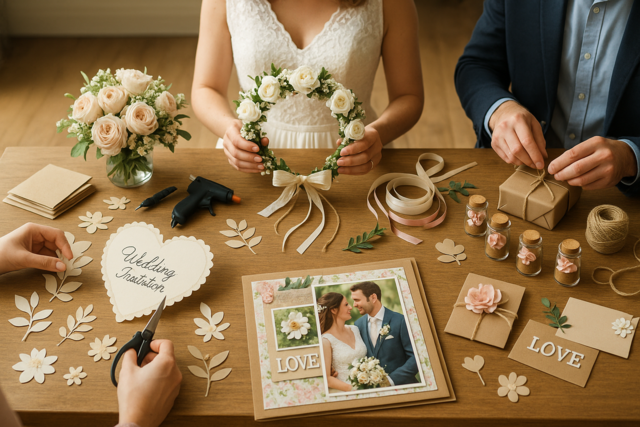One other thing -- try to keep your business name unrestrictive. If you select a name such as Amy's Birthday Parties, and decide to branch out into wedding receptions or the like, the name would be encumbering. Let's say your business is a huge success, however, you want to sell your business. If you are Amy, and the new buyer is Kate, and if the name is changed to Kate's Birthday Parties, the new name would lack recognition. Another reason you should put a lot of thought into your business name: Party planner business names don't work the same as law firm names.
Permits and Licensing - DBA
Congratulations! Now that you have named your party-planning business, it's time to protect your business name and yourself. Most states require you to file a Doing Business As (DBA) if you are doing business under a name different than your legal name. A DBA is an official and public registration of a business name. DBAs are also called Fictitious Names, Fictitious Business Names, Trade Names, and Assumed Names. A DBA is necessary if you want to open a bank checking account under your business name, or other than a Sole Proprietorship, which is under your own name.
All states differ in their regulations regarding DBA Filing. They are usually filed at the state level and sometimes at the county level. DBAs must be filed in the state or county in which you will be conducting business. Most DBA filings take one to four weeks.
Most small business advisors recommend you get an EIN only when:
- You have a corporation
- You have employees
- You need to open a business account
- You want to build corporate business
Sole Proprietors
Many event planners conduct business as sole proprietors because it's the easiest way to operate: less paperwork, does not require a business account, and you can use your own social security number. The downside is, you are liable for any losses, legal actions, etc. This can wipe out your personal and business assets if the loss is serious enough.
Partnership
If you are planning on working with another event planner, you are basically forming a partnership. They are easy to form, and you don't have to file any documents to make the partnership legal. You will need a partnership agreement spelling out both partner's responsibility, since each partner is responsible for the other.
Limited Liability Company
The Limited Liability, or LLC, has the tax structure of a partnership, yet protects each partner's personal interests.
Corporations
Very few party planners choose this way of conducting business, because the cost to form a corporation is steep and the company must pay corporate taxes. The main benefits are that it is easier to obtain financing should you wish to expand your business in a big way, and the corporation alone is legally responsible for any losses, protecting any employee's personal assets.
Permits and Licensing
Many areas require party planners to obtain certain licenses and permits to comply with local regulations. As a party planner, you may need the following to do business:
- License to sell alcohol
- Business license to abide by certain zoning and parking regulations
- Fire Marshall's permit for large events. and parties setting off fireworks or certain special effects.
- Vendor's permit allows you to buy and resell
- Parade permit
- Health department permit if you also cater events and handle food (Party caterers must also have these permits on display at their place of business).
To learn if you need a particular license or permit, check with the following sources:
Small Business Administration, Small Business Development, both located at www.sba.gov
Choosing Insurance and Risk Exposure
There is no manual to tell party planners which type, and how much, business insurance they should carry. Here's a scenario you will never want to happen to you:
You are producing a fabulous 50th wedding anniversary gala. You have all your bases covered, including copies of all vendor insurance, naming you as an additional insured. Everything is on schedule and moving along splendidly. The food presentation is delicious and lovely to look at, even though the chef and one of the servers exchanged a few off-color words.
The next morning, the party planner received a call from the owner of the venue asking for the name of her insurance carrier. The bad news - the planner learned from her carrier she was not covered for that type of accident. As a result, the party planner had to pay out of pocket. A lot.
Don't let this happen to you. Shop around for a broker or agent you feel comfortable with and discuss your needs with him. Here is an idea of the insurance coverage that may be required for a party planner:
- Commercial General Liability Insurance - A must have for all party planners. Peanut, Wheat, and grain allergies are serious potential risks.
- Malpractice Insurance - If you and your caterer don't show up for a wedding reception or a large party, it's grounds for malpractice.
- Hired and Non-owned Auto - You and your staff can rent and drive autos and trucks.
- Workers' Compensation Insurance - Only if you have employees and they receive an injury on the job or while on company business.
- Bonding - This is mainly for event planners that sell large numbers of tickets, such as for concerts. You must put aside a certain amount of money in a separate account for the client, in case your business goes under.
Planning Social Parties
For those who panic at the thought of inviting three couples to their home for a dinner party, a party planner is an essential advisor. Not only will clients gain knowledge from a party planner, decisions that would normally disorient them become absolutely doable.
Be creative. Even though your birthday party stems from a simple plan, you can always put a creative twist on it. Fresh themes are important since, for certain celebrations, guests will be attending many similar parties and want to share in all their friend's celebrations.
Happy social clients give referrals and you can set the stage for evolving your business. Words of caution, certain events are tied to traditions you should be aware of. A traditional wedding celebration, for example, includes:
-
The processional (here comes the bride and bridesmaids).
-
Content or vows
-
Recessional (bride and groom leave the church for photo taking or the reception).
-
Reception with introductions and toasts to the bride and groom
-
Cutting of the cake
-
Bride and groom special dances, joined by their wedding guests.
Most would-be brides haven't the slightest idea what should be done when making wedding decisions. As a party planner, familiarize yourself with social and ethnic customs before you draw up a proposal.
Every party planner has a checklist. Run several of these off to keep handy for the upcoming parties you will plan. Here is an example for a wedding checklist;
-
Venue Rental
-
The rehearsal ceremony and rehearsal dinner venue
-
Hair and makeup
-
Bridal Gown and bouquets
-
Bridal party wardrobe and bouquets
-
Before-wedding snacks for the bridesmaids and groomsmen. Will the bride dress at the church, and is that included in the ceremony fee?
-
Pastor, Priest or Rabbi
-
Organ Music for the processional
-
Floral arrangements
-
Miscellaneous decor
-
Rentals
-
Reception decor
-
Photo session
-
Cocktail hour
-
Entertainment
-
Introductions
-
First dance
-
Food (Line up the caterer.)
-
Sample food and cakes, if possible.
-
Cake cutting
-
Bouquet and garter toss
-
Dancing and socializing
-
Wedding party departure.
Certain weddings will require a lesser or larger checklist. This is a basic idea of areas to consider.
It's not all peaches and cream for the social planner. Children's birthday parties, for example, run non-stop. That's why it's best to keep them to about two hours. Even while they're eating, when you are serving hot dogs or burgers, they are still wired up. Opening gifts is another bore for younger party guests. Why? Because the gifts are all for someone else. This is a great opportunity to invite the child to personally hand their gift to the birthday child. Afterward, play a game where everyone has a chance to win a prize.
You will be expected to know as much as possible about entertainment choices, from magicians to disc jockeys and live bands. Keep an updated file on entertainers with a good track record and ask for leads from other party planners. You may be asked to organize contests, games, and auctions. Nowadays, preparing gift bags and party favors are all part of the job.
Build a portfolio of photographs of the events you coordinate and ask for testimonials from satisfied clients.
If you decide to specialize in special events, such as awards ceremonies, galas, and fund raisers, you may be asked to prepare marketing spots for TV and radio, posters, invitations, or even to arrange accommodations for the visitors.
If you are really serious about becoming a professional party planner, it is recommended that you obtain a Certified Special Events Professional (CSEP) certificate. This is an impressive endorsement to imprint on business cards and when trying to get a foot in the party-planning door.
However you decide, don't get trapped. Many party planners get the location and try to fit the event/party into the space. Put your thinking in reverse: Fit the location into your theme.
Be ready to pitch in and know how to make a great martini, and how to plan a menu for a Greek wedding reception. If a planner decides not to attend the event, who will step in and make those decisions when something goes wrong? If you really want a recommendation from the client, you, as a planner should be there.
Event planning is not a nine to five job. By its very nature, party planning encompasses evenings, weekends, holidays, and even specific seasons. It may surprise you to learn social events involve working more weekends than corporate events. With the exception of children's parties, you can plan on working some evenings when coordinating and supervising certain events. Most of the actual party-planning is done during business hours.
Once the client decides to hire you, ask for a down payment. This is important. Your credibility with your vendors and venue owners could be at stake if the client decides to back out and you don't have enough capital to make payments to your caterer and so forth. Make sure you have a contact person, and keep in mind the old adage about too many cooks.
u
When a bride reveals Bridezilla-like behavior, it may be more than a mere response to the stress of wedding planning. This behavior may indicate a dormant narcissistic personality. It makes you wonder just how many potential grooms brush off the bad behavior as stress ? until they're married for a few months. Even if couples live together before marriage, the bride may stay on good behavior when there is so much at stake. It's usually the wedding planning that brings out her concealed behaviors.
























